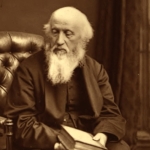It’s a fine fact that whenever I sit in a tavern corner
sipping a grappa, the pederast’s there, or the kids
with their screaming, or the unemployed guy,
the thread of my smoke. That’s how it is, kid,
I’m telling it straight, I work at Lucento.
But that voice, that sorrowful voice of the old man
(forty-ish, maybe?) who shook my hand
one night in the cold and then walked with me back
to my house, that tone like an old cornet—
I’ll never forget it, not even in death.
He said nothing of wine, but spoke to me then
because I had suffered and was smoking a pipe.
“And pipe smokers,” he declared, shaking a little,
“can always be trusted!” I nodded my head.
I came back to find the girls friendlier, healthier,
their skirts cut higher—this after months of hunger—
and I went and got married because I was drunk
on all their freshness—a senile love.
I married the sassiest, most muscular girl
so I’d taste life again, so I wouldn’t die
behind a desk, in an office, surrounded by strangers.
But Nella too was a stranger to me, and a student pilot
saw her with me once, and later laid hands on her.
He’s dead now, that coward—that poor kid—
spun out of the sky—I guess I’m the coward.
Now she’s got her baby—who knows if he’s mine—
who can’t keep her happy. I don’t dare say a word
and neither does Nella, she just looks at me.
It was beautiful how he cried as he told it,
the way a drunk cries, his whole body to it,
and he hung on my shoulder saying, Between us,
always respect, and there I was, shaking with cold,
wanting to leave, and helping him walk.
Sipping grappa is nice, but there’s also a pleasure
in listening to the venting of an impotent old man
who’s back from the front and asks your forgiveness.
What satisfaction will I ever have in this life?
I’m telling it straight, I work at Lucento.
What satisfaction will I ever have in this life?



















Comment form: